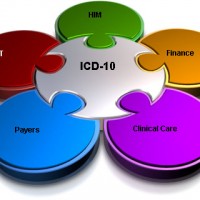
It’s impossible to know what will happen on October 1, 2014, but you can get a head start on your preparations by asking your payers some questions about their ICD-10 plans.
Will you conduct external testing? Medicare says CMS contractors will not conduct full external testing with business partners, meaning you won’t know for sure if your claims can be accepted by the biggest payer in the industry—and, since many health plans follow Medicare’s lead, you could be guessing about other payers as well.
Will you be dual processing, and if so, when will you start? Many payers are planning to dual process, meaning they will accept both ICD-9 and ICD-10 codes for a period of time. That’s a big benefit to you, as it will give your physicians and coders extra time to practice their documentation strategies and coding while seeing exactly what the world will look like after ICD-10. So, it’s a good idea to ask your payers if dual coding will be accepted for a transition period after October 1, and when they will start so you can maximize the benefits of side-by-side coding.
What will happen if something goes wrong? There’s more than a year left before ICD-10 is implemented, and no one knows what’s going to happen on October 1, 2014. As a result, it’s hard to prepare for something going wrong. That, however, is exactly why payers need to have a contingency plan in place. You should, too, as working together with payers during this crucial time is in everyone’s best interests.
If you are looking to begin preparing for the jump to ICD-10, contact us today to see how we can help make the transition as smooth as possible.
Leave A Reply (No comments so far)